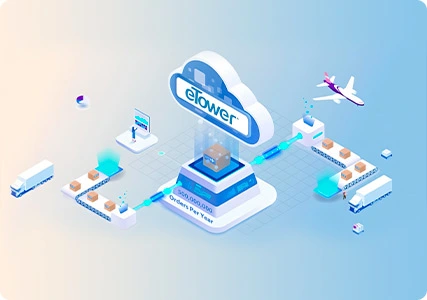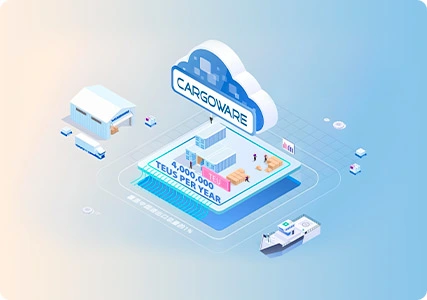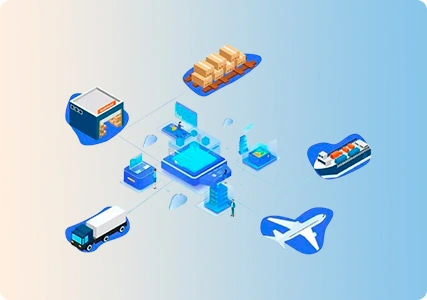
As global trade growth faces a predicted slowdown for the rest of 2023, due to complex factors like inflation and geopolitical tension, logistics service providers find themselves standing on shaky ground. The rapidly expanding shipping capacities and the resulting supply-side explosion are further challenging traditional logistics practices, with increased competition and narrowing profit margins adding to the strain. This crisis, however, could also be an opportunity.
Global trade growth is expected to slide in the remainder of 2023
Recently, the United Nations Conference on Trade and Development has released its latest "Global Trade Update" report (June 2023). According to the report, both goods and services trade saw positive growth in the first quarter of 2023. However, the UN trade body states that due to negative factors such as inflation, financial vulnerability, the Ukraine conflict, and geopolitical tensions, the pace of global trade growth has slowed in the second quarter, and will see continuous decline in the remainder of the year.
Meanwhile, according to the latest Global Port Tracker report by the National Retail Federation and Hackett Associates, although the forecast for the full year has not yet been announced, the total amount of US imports from July to November is expected to decline by 4.6% compared to the same period in 2022.
Supply side is expected to explode in the next three quarters
Meanwhile, shipping giants continue to expand their fleet. Maersk, CMA CGM, and Evergreen have all announced a series of new shipbuilding and retrofitting plans. In June, the delivery volume of new container ships reached 277,873 TEU, setting a new record for the highest monthly new ship delivery volume. According to MSI (Maritime Strategies International), the supply side was expected to "explode" in the next three quarters, with some 2.4m TEU of new-build tonnage due to be delivered through to the end of Q1 next year.
Freight forwarders and logistics companies face greater challenges
The additional capacity put into operation, coupled with the slowing growth of global trade and the ongoing weak demand from retailers in Europe and the US, has severely weakened the freight rates that should have spiked during the same period in previous years.
As the world of logistics gets more and more complex and mission-critical, freight forwarding companies and logistics service providers find themselves emerged in intensified competition and further squeezed profit margins. Efficient and structured collaboration between all involved parties on the basis of up-to-date information and documents at all times has become a core issue.
Advantages of Digital Transformation
In the traditional logistics procedures, large amount of paperwork and manual operation is often involved, which is time-consuming, prone to delays and errors. Besides, without a digital platform, it is much harder to track shipments in real-time, which can lead to a lack of transparency and increased uncertainty. Additionally, traditional logistics procedure has been paper-intensive, resulting in environmental impact. These ultimately all leads to low efficiency and high costs. Freight forwarding companies and logistics service providers needs digital transformation now than ever.
SaaS, or Software as a Service, is one of the most effective and cost-saving ways to transform a business digitally without investing in an expensive IT team. However, a poor SaaS platform might have a confusing interface, poor customer support, lack security features, offer little to no future upgrade and customization, and have poor integration with other software.
How to distinguish a good logistics SaaS
Ease of Use: A good SaaS platform should be user-friendly and have customer training personnel poised. If it takes too much time to understand how to use it, or if there’s no customer support at hand, it's probably not the best choice.
Integrations: A good SaaS platform will easily integrate with the other software/website your business is already using. This can range from accounting software, ERP systems, CRM tools, warehouse management systems or ecommerce platforms.
Real-time Tracking: The platform should allow for real-time tracking of shipments. Real-time information about shipments' locations and statuses can improve communication between stakeholders and increase visibility in the supply chain.
Collaboration: different roles along the logistics chain, include the integrators (logistics service providers), sellers/manufacturers, transportation service providers, other service suppliers and the end-customers (buyers) should be able to collaborate using one platform.
Customer Support: Good customer service, system upgrading and technical support are essential. If you encounter problems or have questions, you need to know that the provider will be responsive and helpful.
Security: As with any software platform that handles business data from different clients, it's crucial that it has robust security features. A multi-tenant SaaS platform should build based on renowned internet service provider and store clients data in unique backup servers.
Customizability: The platform should be customizable to meet the unique needs of your business. This includes features like customizable modules, reports and interfaces.
Scalability: The platform should be able to grow with your business. It should be capable of handling new requirements, increased data, users, and operations as your logistics needs expand.
About eTower
eTower, a product of WallTech Co. Ltd, is a logistics collaboration SaaS (Software as a Service) platform with a speciality in the cross-border e-Commerce sector. Modular, flexible and highly customizable, eTower connects the whole logistics chain for logistics service providers to manage from the upstream sellers/manufacturers, sorting hubs, transportation, warehouses, last-mile carriers, all the way to end customers.
Through eTower's comprehensive API integration ability, all divisions in the cross-border logistics chain can easily share data and work together efficiently and conveniently.
Powered by AWS (Amazon Web Services), eTower helps users around the world connect and interact on the same platform without internet boundaries while also ensures data security.
Being the choice of State-run Logistics Service Providers such as UBI, Direct Link (PostNord), APG (Australia Post), Purolator (Canada Post), Crane Worldwide Logistics, Spring, Japan Post, eTower helps logistics providers (freight-forwarders/3PL/4PL) and trading companies who have the heart and strength to quickly cut into the field of complicated international logistics markets, helping logistics providers or sellers focus on their areas of expertise without being bound by IT issues.
About WallTech
WallTech (Shanghai WallTech Information Technology Co., Ltd.), founded in 2011, is a industry leading research and development company for logistics SaaS cloud service platforms.
After 12 years of steady development, WallTech has built a cloud service product matrix based on the international freight forwarding logistics cloud service CargoWare, and the cross-border e-commerce logistics collaborative cloud service eTower.
WallTech tightly integrates advanced technology and rich experience in the cross-border logistics industry, empowering the digital transformation and upgrading of traditional international logistics enterprises, effectively improving business operational efficiency, and reducing enterprise operating costs to the greatest extent.
For more information about eTower and WallTech,welcome contact us or visit www.etowertech.com










